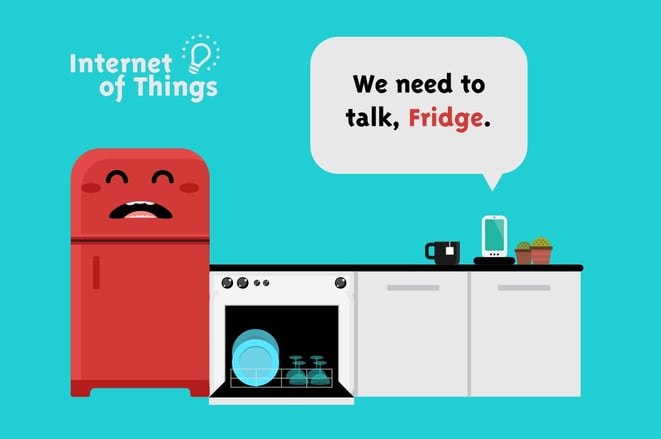
We are on the cusp of a network revolution. The industry magazines are full of articles about it. The growth is going to be phenomenal; it’s going to change our lives. Companies that ride the wave of this are going to make millions. It will be a 15 trillion dollar business within 20 years. John Chambers from Cisco said “that it will be five to ten times more impactful than the internet has been to date.”
Sounds fantastic, what is it and how do I buy some shares? But, if it’s going to be that big; how come none of my friends have heard about it?
The Internet of Things or IoT is a scenario in which objects, animals or people are provided with unique identifiers and the ability to transfer data over a network without human interaction. The ‘thing’ is therefore anything you want to monitor, search for, manage or control. This is also sometimes called the Internet of Everything.
Remember the popular smart home concept from a few years ago where we were told that as we empty the fridge or kitchen cupboard, the items we used would be automatically added to the shopping list and turn up on our doorstep with the next grocery delivery? That’s the sort of scenario enabled by IoT. Want to remotely turn on or off the lights, home heating, hot water or see how much water, electricity or gas you are using in real time and be able to make choices about discretionary demand decisions to save money? For businesses the opportunity is to lower cost through improved processes and visibility of objects so that business decisions can be made based on real time information. That’s all enabled by IoT. Keith Ashton from Proctor and Gamble put it this way “We need to empower computers with their own means of gathering information, so they can see, hear and smell the world for themselves, in all its random glory. RFID (radio frequency identification) and sensor technology enable computers to observe, identify and understand the world – without the limitations of human-entered data.”
Connecting things to the internet is not new, but it’s the scale of this opportunity and almost limitless business opportunities enabled by the scale and technology that makes this exciting. Ten years ago there were around 500 million devices connected to the internet, today there are around 15 Billion (not surprising when evidently already there are more cell phones in the world than toothbrushes) and in 5 years’ time they are forecasting more than 50 Billion devices connected to the internet. What’s more, research companies like Gartner, McKinsey and IDC all seem to agree on the numbers.
So back to my earlier point. If this is going to be so big, why don’t my friends and neighbours know about this? One reason is it’s been coming for years. It’s a technological progression not a revolution. It’s more about the confluence of network technology; devices that are now small and cheap enough, as well as the maturing business model on how this all might be pulled together that mean this dream will soon become reality. The latter point – the business model – is the salient point for me. Having a device or ‘thing’ connected to internet might be interesting, but would I buy one? It probably doesn’t matter, the potential business benefits are so large that this will happen in so many areas without the consumer making a conscious decision to buy one. Remotely read electricity meters and parking space indicators in parking buildings are common examples. This is also why the average person on the street is unaware or even concerned about this impending sea-change.
The secret sauce is turning that thing (product) into a service. Show me that I can get more value, save time or money, or make my life easier by connecting ‘things’ to the internet then I’m all-in and my friends and neighbours will be too. This value proposition holds true for consumers, businesses and service providers alike.
Until then, the potential of the Internet of Things will be unrealised and we will be talking about the Internet of What could have been. I have a feeling it’s just a (short) matter of time though.